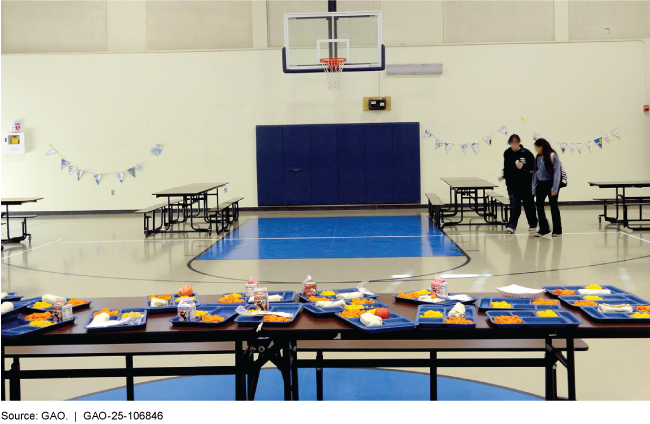School Meal Programs: Additional Data and Outreach Could Help Charter School Participation
Fast Facts
Charter school participation in the National School Lunch Program has increased in the past 5 years. But participation rates are uneven. In 13 states, all charter schools participated. In 5 states, less than half did. How can the Food and Nutrition Service (FNS) address this?
More data—FNS hasn't attempted a study of charter school participation since 2018 and could look for cost-effective ways to get this information
Outreach—FNS and states have help available, such as guidance specifically for charter schools. But, most school representatives we spoke with said they were unaware of these resources
Our recommendations address these issues.
A charter school lunchroom, which is also the gymnasium

Highlights
What GAO Found
Eighty-five percent of charter schools nationwide participated in the National School Lunch Program in school year 2022-23, increasing from 64 percent in school year 2018-19, according to Department of Education data. Charter school participation rates varied by states. For instance, 13 states and Puerto Rico had 100 percent participation in school year 2022-23 and five states had less than 50 percent participation. In 2018, the Food and Nutrition Service (FNS) in the U.S. Department of Agriculture (USDA) collected information for its annual child nutrition operations study to better understand charter school participation in the National School Lunch and School Breakfast Programs (school meal programs) that could inform potential reasons for state variation. However, due to study challenges, FNS was not able to use the information and has not tried to explore these issues since. FNS officials said that it would be resource intensive to include enough charter schools in a study to obtain statistically valid findings, but the agency has not recently assessed the feasibility or cost of doing so. Collecting information on charter schools in cost effective ways, such as by leveraging prior efforts, could help FNS better support states and schools.
Charter School Participation Rates in the National School Lunch Program, School Years 2018-19 and 2022-23

Officials from the 14 charter schools in GAO's review that participate in the National School Lunch Program reported facility, vendor, and staffing challenges in operating school meal programs. For example, most school officials said that limited kitchen or eating space makes it difficult to prepare or serve food, as a number operated in non-traditional spaces. Many of those schools contracted with vendors for prepared meals, but also reported challenges with using vendors, such as canceled contracts.
Selected states—which oversee local school meal program operations—and FNS provided assistance that could help charter schools address challenges. Examples of assistance from states included training, funds for facility improvements, and informational resources. Similarly, FNS has provided assistance, such as program guidance in 2018 specifically on charter schools. However, school officials GAO interviewed said they were unaware of some existing resources and would benefit from additional outreach. Specifically, 12 of 14 schools that participated in school meal programs did not know of FNS's 2018 guidance for charter schools, which links to resources and answers questions pertinent to charter schools, although it is available on FNS's website. As more charter schools are participating in school meal programs, taking steps to ensure they receive relevant information through additional outreach could help them address challenges and promote greater access to school meals.
Why GAO Did This Study
The school meal programs provide nutritious meals to millions of students each day. In fiscal year 2023, federal spending for these programs was $21 billion. It is unclear how many charter schools participate in these programs or what factors can affect their participation.
GAO was asked to review charter school participation in school meal programs. This report examines (1) available data on charter school participation in the National School Lunch Program over the past 5 years and factors affecting participation, (2) challenges that charter schools in selected states faced in school meal program participation, and (3) assistance from selected states and FNS that could help address identified challenges. GAO analyzed Education data on charter school participation in the National School Lunch Program for school years 2018-19 and 2022-23. GAO reviewed information from four states and 16 charter schools selected for geographic diversity, program participation, and other criteria; and interviewed state and school officials, visiting schools in two states. GAO also reviewed relevant federal laws and regulations, FNS documents, and interviewed FNS officials.
Recommendations
GAO is making two recommendations to USDA to assess whether there are cost-effective ways to study factors that affect charter school participation in school meal programs and to conduct additional outreach to charter schools on school meals that could help address identified challenges. USDA concurred with both recommendations.
Recommendations for Executive Action
| Agency Affected | Recommendation | Status |
|---|---|---|
| Department of Agriculture | The Secretary of Agriculture should ensure that the Administrator of FNS conducts an assessment to determine whether there are cost-effective ways to obtain reliable information on state-level variation in participation and factors that affect charter schools' ability to participate in school meal programs. (Recommendation 1) |
USDA agreed with this recommendation. We will monitor the agency's progress to address it.
|
| Department of Agriculture | The Secretary of Agriculture should ensure that the Administrator of FNS conducts additional outreach to share relevant information on school meal programs with charter schools. Such outreach could include encouraging state agencies to share reminders of existing resources with charter schools, such as FNS's memorandum on charter schools or the Child Nutrition Sharing Site. (Recommendation 2) |
USDA agreed with this recommendation. We will monitor the agency's progress to address it.
|
